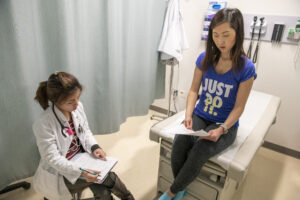Clinical partnerships are one of the UW School of Nursing’s most precious resources in preparing the next generation of advanced practice registered nurses and advanced systems and population health experts. Clinical preceptors have a deep interest in and commitment to our academic programs and demonstrate excellence in clinical practice and community service. Clinical preceptors provide an invaluable piece of students’ clinical education.
Why clinical experience is important?
Our students need high-quality, precepted clinical experiences on a quarterly basis as part of their education. Students in the Doctor of Nursing Practice (DNP) spend four quarters in clinical placements and one to three days per week each quarter, depending on the track and stage of their education. Through clinical placements, our graduate students have an extraordinary opportunity to learn and work alongside skilled mentors-preceptors through clinical rotations.
Clinical placements can take place in a variety of settings:
- Hospitals
- Community clinics
- Nonprofit settings
- Private practice
- School wellness centers
Precepting prepares DNP students
The UW DNP prepares advanced practice nurse practitioners and graduate-level nurses in accordance with the American Association of Colleges of Nursing Essentials of Doctoral Education for Advanced Nursing Practice. The UW School of Nursing is a leader with a longstanding commitment to advanced practice preparation. We are pioneers in DNP education and launched the DNP program in 2007. UW was among the first 50 schools in the country to move to the DNP. DNP students learn to synthesize and expand their knowledge and skills about advanced practice, leadership, and practice inquiry.
The following healthcare professionals can precept our students:
- Family, Adult-Gerontology, and Pediatric students: ARNP, MD, DO, or PA
- Midwifery students: ARNP, CM, or CNM
- Psychiatric Mental Health students: ARNP, MSW, or MD
- Community Health: Contact Betty Bekemeier (bettybek@uw.edu)
To explore a clinical partnership, clinical placements or precepting, please contact the Office of Clinical Placements (sonocp@uw.edu).
As a clinical preceptor, you will receive:
- Opportunities to mentor and help others meet their potential as future nurse leaders
- Access to UW Libraries resources, including the world-class Health Sciences Library
- Opportunity to obtain affiliate faculty status
- Clinical placements are coordinated by a single point of contact
- Opportunities to interface with engaged, highly skilled faculty
- Regular site visits by faculty
- 15 percent Continuing Nursing Education discount
- Discounts and free admission at various UW campus venues
- Eligibility to apply for membership at the Intramural Activities Center
- Eligible for discounts at the University Bookstore with Pack Rewards
Preceptor Standards
The requirements, skills, and training necessary to become a UW School of Nursing preceptor vary depending on the specific student experience. Generally, UW School of Nursing Preceptors are required to:
- Meet or exceed all legal and professional standards required to provide patient care, including being actively licensed and in good standing with national, state or local regulatory bodies;
- Preceptors are advised to be fully oriented to their agency setting before precepting a student;
- Be compliant with all employee requirements set forth by the site, including policies, procedures, and trainings and with all requirements defined in the affiliation agreement between the School of Nursing and the host organization;
- Reflect about your own ability to be accessible to the student; professionally and legally supervise the student during the experience; and, provide sufficient learning opportunities in both amount and variety;
- Provide a thorough orientation to the site before or at the start of the rotation to facilitate a smooth transition to the site, organize the student’s experience, and optimize use of available resources;
- Be a role-model professional, providing a high standard for quality care that meets your professional code of ethics;
- Be an effective, organized, and enthusiastic teacher, supporting the student to meet their course objectives as outlined in the course syllabus;
- Exhibit superior skills in interpersonal relationships, communication, leadership, and management;
- Encourage self-directed learning;
- Clearly explain the expectations for the student, particularly in the areas of dress, conduct, scheduling of hours, and general characteristics of practice;
- Constructively and privately convey feedback to the student;
- Complete required evaluation materials (from UW School of Nursing) in an accurate, objective, and timely manner; and,
- Communicate regularly with the student’s clinical instructor regarding student performance and progress.